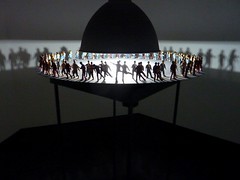December 20, 2012
Zombie concepts
 I was writing a paragraph on philosophical zombies and why I consider them incoherent when I wrote the sentence:
I was writing a paragraph on philosophical zombies and why I consider them incoherent when I wrote the sentence:
"Or consider zombie-Earth, where everybody is a zombie: why would they choose to talk just about consciousness out of the vast range of non-existent concepts?"
Then it hit me: we humans might be just as bad. We have chosen plenty of arbitrary and likely non-existent concepts to not just discuss, but to make central for our thinking and policies. Just consider "God", "free will" or "the lumiferous ether".
Now, many people I have talked to do consider gods to be intuitively obvious things that simply have to exist, and people like me who simply "don't get it" must be somehow debased or out of tune with their inner voices. Maybe we are like philosophical zombies unable to have proper religious experiences. Or maybe we are all like that.
Free will is likely just a reified oversimplification: from the outside humans clearly make choices in ways that cannot be predicted, and they are free to make them (and often do) for exceedingly obscure internal reasons. That this process does not need radical indeterminism was not obvious until we started learning about complex, chaotic and hierarchical systems.
The ether was a honest mistake: it was invoked since people couldn't intuitively comprehend waves propagating without a medium. So they invented a medium where there was none. And for a long time people tended to mix up the hypothesis with reality, and got a bit of a shock when it all got replaced with nothing at all.
Imagine a concept X. It does not refer to anything: it is totally empty. Why would we try to use it? Maybe as a joke, but also as a mistake: somebody thought for whatever reason X refers to something. When trying to use it we will add attributes to it. It will be used in some contexts but not others, we will recognize that saying that a person "has X" makes sense but not that a rock "has X". Over time it turns into a floating signifier, embedded in our messy and social language. It might become seen as having a very deep meaning since many philosophers have tried to define it, writing deep books on the topic of X. If it is deep, it is likely important, so we better pay attention to it. And so it might become fixed as an important part of our conceptual world, despite not referring to anything much.
It is a bit like the situation where a neutral allele gets fixed in a population out of chance: it does not confer an advantage, but everybody has it. And it might become linked to other important things (like genes that are essential for life) so removing it now would be lethal.
I wonder how much of our "big" concepts are actually zombies?
I would bet far more "big" concepts are zombies than "small" and simple concepts. There are so more ways of being an unicorn than a pack mule that it is hard not to get at least one of them filled with fictional reality.
Posted by Anders3 at December 20, 2012 06:17 PM